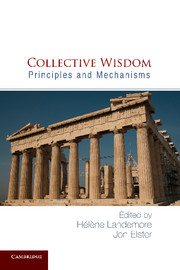Crossref Citations
This Book has been
cited by the following publications. This list is generated based on data provided by Crossref.
Mercier, Hugo
and
Sperber, Dan
2011.
Why do humans reason? Arguments for an argumentative theory.
Behavioral and Brain Sciences,
Vol. 34,
Issue. 2,
p.
57.
2012.
Gouverner le capitalisme ?.
p.
261.
Cardon, Dominique
2013.
Dans l'esprit du PageRank.
Réseaux,
Vol. n° 177,
Issue. 1,
p.
63.
Ingham, Sean
2013.
Disagreement and epistemic arguments for democracy.
Politics, Philosophy & Economics,
Vol. 12,
Issue. 2,
p.
136.
OBER, JOSIAH
2013.
Democracy's Wisdom: An Aristotelian Middle Way for Collective Judgment.
American Political Science Review,
Vol. 107,
Issue. 1,
p.
104.
Landemore, Hélène
2013.
On Minimal Deliberation, Partisan Activism, and Teaching People How to Disagree.
Critical Review,
Vol. 25,
Issue. 2,
p.
210.
Lyon, Aidan
and
Pacuit, Eric
2013.
Handbook of Human Computation.
p.
599.
Landemore, Hélène
and
Bandini, Aude
2014.
Pourquoi le grand nombre est plus intelligent que le petit nombre, et pourquoi il faut en tenir compte.
Philosophiques,
Vol. 40,
Issue. 2,
p.
283.
Landemore, Hélène
2014.
Yes, We Can (Make It Up on Volume): Answers to Critics.
Critical Review,
Vol. 26,
Issue. 1-2,
p.
184.
Friedman, Jeffrey
2014.
Political Epistemology.
Critical Review,
Vol. 26,
Issue. 1-2,
p.
i.
Wallin, Annika
and
McElreath, Richard
2015.
STRATEGIES FOR ADVICE TAKING: THE ROLE OF EPISTEMIC SOCIAL INFORMATION.
Economics and Philosophy,
Vol. 31,
Issue. 1,
p.
67.
2015.
Sciences et décision.
p.
127.
Landemore, Hélène
and
Page, Scott E.
2015.
Deliberation and disagreement.
Politics, Philosophy & Economics,
Vol. 14,
Issue. 3,
p.
229.
Cheibub, José Antonio
Martin, Shane
and
Rasch, Bjørn Erik
2015.
Government Selection and Executive Powers: Constitutional Design in Parliamentary Democracies.
West European Politics,
Vol. 38,
Issue. 5,
p.
969.
Anttiroiko, Ari-Veikko
2015.
Emerging Issues, Challenges, and Opportunities in Urban E-Planning.
p.
1.
Ober, Josiah
2015.
Political Knowledge and Right-Sizing Government.
Critical Review,
Vol. 27,
Issue. 3-4,
p.
362.
Koit, Mare
and
Õim, Haldur
2015.
A computational model of argumentation in agreement negotiation processes.
Argument & Computation,
Vol. 6,
Issue. 2,
p.
101.
Schwartzberg, Melissa
2015.
Epistemic Democracy and Its Challenges.
Annual Review of Political Science,
Vol. 18,
Issue. 1,
p.
187.
FELIN, TEPPO
2015.
A forum on minds and institutions.
Journal of Institutional Economics,
Vol. 11,
Issue. 3,
p.
523.
Tian, Ye
and
Cai, Guoray
2016.
Collective Opinion Formation for Public Decision Making in Local Governments.
p.
174.





